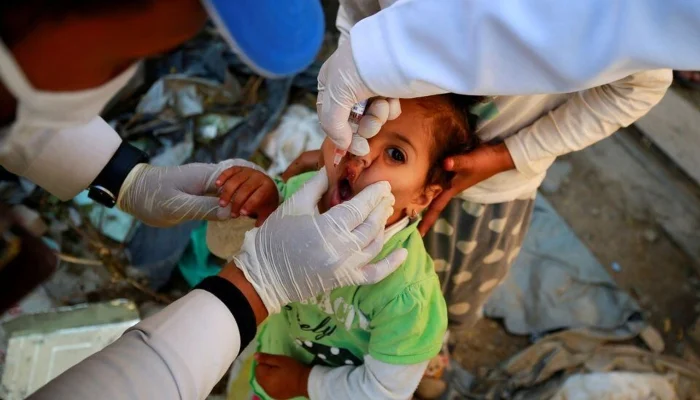ISLAMABAD The Polio Eradication Initiative (PEI) said on Saturday that 30 environmental samples from different cities in all four provinces of Pakistan tested positive for wild poliovirus 1 (WPV1). According to The News, 28 of these samples were taken in January 2024 and two in December 2023.
Twenty samples total were found in Karachi; four were found in district East, two in each of the districts Keamari and South, and one each in the districts Central, Korangi, and Malir.
The identification of Type-1 Wild Poliovirus (WPV1) in 30 environmental (sewage) samples has been validated by the Regional Reference Laboratory for Polio Eradication at the National Institute of Health Islamabad. Districts Quetta, Karachi East, Dera Ghazi Khan, Karachi Central, Karachi Korangi, Karachi Malir, Hyderabad, Jamshoro, Sukkur, Pishin, Kech, Nasirabad, and Khuzdar provided five of these samples, two from each of the aforementioned districts, and one each from Karachi Keamari, Karachi South, Chaman, and Peshawar.
Environmental samples were gathered in Quetta from the following locations: Railway Pul, Surpul, Tawoosabad, Jatak Killi, and Takhthani. 99.5% of the isolated viruses are genetically related to the virus found in an environmental sample in Kandahar, Afghanistan on the 21st, and are categorized as YB3A clusters.
The first positive sample from District Khuzdar in 2023 was taken on December 27, 2023, from the “Katan Pul” environmental sample collection location in Khuzdar.
Additionally, wild poliovirus was found in the sewage from the “Dhok Dalal” in Rawalpindi, the Main Disposal in Dera Ghazi Khan, and the Outfall Station-G environmental sample collection site in Lahore. The virus that was recovered is categorized as a “ORPHAN” YB3A cluster and has a genetic linkage of 98.34% to the virus that was found in an environmental sample in Jalalabad, Afghanistan, on April 2, 2023. Environmental samples from Sohrab Goth, Machar Colony, Rashid Minhas Road, and Chakora Nullah environmental sites were found in Karachi East.
Similar to this, poliovirus was discovered in the sewage of Muhammad Khan Colony and Orangi Nala in Keamari, and it was discovered in the environmental sample collecting sites of Hijrat Colony and Manzoor Colony Nallah in Karachi South. Poliovirus was discovered in the sewage sample taken from Haji Mureed Goth in Karachi Central.
Poliovirus was discovered in environmental samples taken from Korangi Nullah in the Karachi district, and it was discovered in the sewage of Landhi Bakhtawar Village Colony in Malir.
Poliovirus was discovered in Jamshoro in a sewage sample taken from the Drain KB Feeder, and in Hyderabad at the Latifabad Pumping Station environmental sample collection site. Sewage samples taken from the Makka Pumping Station environmental sample collecting site in Sukkur contained poliovirus.
Poliovirus was found in environmental samples from the Army Kaziba and Hadi Packet environmental sample collection sites in Chaman, while Turwa environmental sample collection site in Pishin had the virus. Sewage from the Turbat Town environmental sample collecting site in Kech contained poliovirus. A sewage sample from the Wapda Colony environmental sample collection site in Kech contained poliovirus.
Poliovirus was found in Shaheen Town and Naray Khuwar Palosi Pul environmental sample collecting sites in Peshawar.
With these two new detections, there will be 126 positive environmental sample results for 2023. In 2024, there will be a total of 28 positive environmental sampling results.






